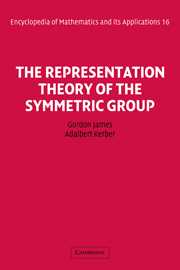Book contents
- Frontmatter
- Contents
- Editor's Statement
- Section Editor's Foreword
- Introduction by G. de B. Robinson
- Preface
- List of Symbols
- The Representation Theory of the Symmetric Group
- Chapter 1 Symmetric Groups and Their Young Subgroups
- Chapter 2 Ordinary Irreducible Representations and Characters of Symmetric and Alternating Groups
- Chapter 3 Ordinary Irreducible Matrix Representations of Symmetric Groups
- Chapter 4 Representations of Wreath Products
- Chapter 5 Applications to Combinatorics and Representation Theory
- Chapter 6 Modular Representations
- Chapter 7 Representation Theory of Sn over an Arbitrary Field
- Chapter 8 Representations of General Linear Groups
- Appendix I Tables
- Appendix II Notes and References
- Index
Chapter 2 - Ordinary Irreducible Representations and Characters of Symmetric and Alternating Groups
Published online by Cambridge University Press: 05 December 2015
- Frontmatter
- Contents
- Editor's Statement
- Section Editor's Foreword
- Introduction by G. de B. Robinson
- Preface
- List of Symbols
- The Representation Theory of the Symmetric Group
- Chapter 1 Symmetric Groups and Their Young Subgroups
- Chapter 2 Ordinary Irreducible Representations and Characters of Symmetric and Alternating Groups
- Chapter 3 Ordinary Irreducible Matrix Representations of Symmetric Groups
- Chapter 4 Representations of Wreath Products
- Chapter 5 Applications to Combinatorics and Representation Theory
- Chapter 6 Modular Representations
- Chapter 7 Representation Theory of Sn over an Arbitrary Field
- Chapter 8 Representations of General Linear Groups
- Appendix I Tables
- Appendix II Notes and References
- Index
Summary
The present chapter contains a characterization of the ordinary irreducible representations of symmetric groups as common constituents of monomial representations induced from Young subgroups. Besides this, the ordinary irreducible characters are given as ℤ-linear combinations of permutation characters induced from Young subgroups, and an important recursion formula is derived. As an application, the ordinary irreducible characters and representations of An are given. It is shown furthermore, that Sn is characterized by its character table. An examination of the values of the irreducible characters leads to the notions of cores and quotients of partitions which later on are of great importance for modular purposes. Finally, the Littlewood-Richardson rule, which is one of the most useful results of the whole theory, is derived.
The Ordinary Irreducible Representations of Sn
By an ordinary representation of a group G we mean a finite-dimensional representation of G over the field ℂ of complex numbers. It will turn out that each ordinary representation of Sn can be realized over the rational field, so that ℚ (and thus every field) is a splitting field for Sn. Hence it does not make much difference whether we assume that the groundfield F is of a characteristic which does not divide n! or we just consider the ordinary representations of Sn.
We know from general representation theory of finite groups that Sn has the same number of ordinary irreducible representations as conjugacy classes.
Information
- Type
- Chapter
- Information
- The Representation Theory of the Symmetric Group , pp. 34 - 100Publisher: Cambridge University PressPrint publication year: 1984
